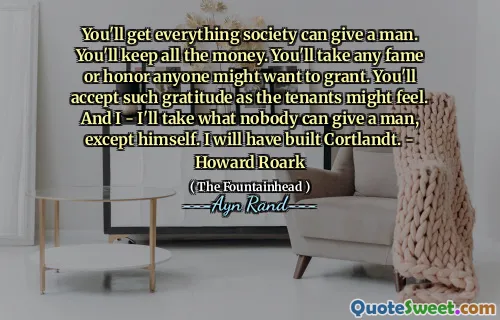
Roark spoke quietly. He was the only man in the room who felt certain of his own words.
This quote highlights the power of conviction and self-assurance, even when one chooses to express oneself with quiet confidence. The setting suggests a scenario where many may be voicing opinions or competing for attention, yet Roark remains calm and certain about his stance. This embodies the theme of integrity and individualism found in Ayn Rand's work. In a world that often values loudness or outward appearances, true confidence sometimes resides in subtlety and inner certainty. Roark’s quiet demeanor signifies that true strength and conviction do not necessitate shouting or boasting; instead, they stem from a deep understanding and belief in one's principles. His silence could be seen as a form of power—the kind that commands respect through quiet assurance rather than through loud declarations. The idea resonates strongly with the philosophy of Objectivism presented by Rand, emphasizing rational self-interest, independence of thought, and unwavering pursuit of one's vision regardless of external pressures. This scene serves as a reminder that confidence grounded in conviction can be more impactful than the most vociferous of voices. It challenges the misconception that success and certainty are inherently linked to loudness or bravado, offering instead an inspiring lesson on the lasting influence of quiet confidence rooted in firm belief. Such an attitude fosters authenticity and encourages individuals to trust their judgment amidst external noise. In a broader sense, the quote underscores the importance of inner certainty as the foundation of true leadership and authenticity in an increasingly noisy world.








